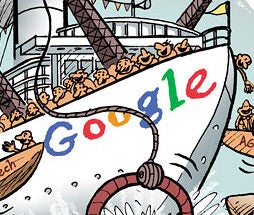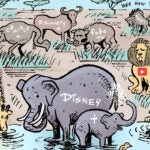Google has always been the internet waystation. People arrive to be shuttled someplace else.
Increasingly, though, Google is the destination.
Consider the Google ad portfolio. YouTube ad revenue grew from almost $8 billion in Q4 2022 to $9.2 billion last quarter, the company reported in earning Tuesday afternoon. Google Search added more than $7 billion year over year, rising to $48 billion.
Google’s total revenue grew by 13%, from $76 billion to $86.3 billion.
The Google Network revenue, though, ticked down by about $200 million, or 2%, to land at $8.3 billion, continuing its steady decline.
Alphabet CEO Sundar Pichai told investors he’s focused on four main investment categories: Search, particularly AI-generated search responses, the Google Cloud Platform, Google’s subscription businesses (YouTube TV, YouTube Premium, Google Music and Google One) and future growth opportunities, which are Search, YouTube and Cloud.
And the Googleverse consolidation is true in smaller ways, too. Google’s various devices businesses, including Nest, Fitbit and Pixel, were folded into one organization last quarter. Google Nest data is already used for personalized advertising, too, if you use a Google-owned service like Assistant or YouTube to access the Nest app.
In 2025, Fitbit customers will all be migrated to Google accounts, so they’ll be part of the core advertising identity graph.
Ice water for AI
Compared to the blind optimism for AI in previous earnings reports – by Google and seemingly every other tech company – the Google execs and investor team were more muted, or at least rational, when it came to AI.
Take Performance Max, which has been a staple topic during Google’s quarterly earnings reports for the last year and half.
But Performance Max is two years old at this point, said UBS analyst Stephen Ju. “There’s been this long lineage of product development” for PMax, , referring to the steady rollout of PMax product updates.
Pichai also laid out where he sees Google’s investments in AI going, in terms of Google products.
Eventually, a Google assistant could be capable of fielding practically any query with a generative response of either text, image, audio or video and “allows us to act like an agent,” he said.
“That is, directionally, the opportunity set,” he said. But it’s early days in a long process, he cautioned. Google’s current self-generated search responses work well for some kinds of queries, although there remains latency in delivering the response.
But Pichai added that people underestimate the “breadth” of searches per day Google sees. Google gets far more never-before-seen queries per day than you’d expect. An AI chatbot that generates content on the fly to meet those queries is going to be challenged, even if some aspects of self-generated search responses are a hit.










